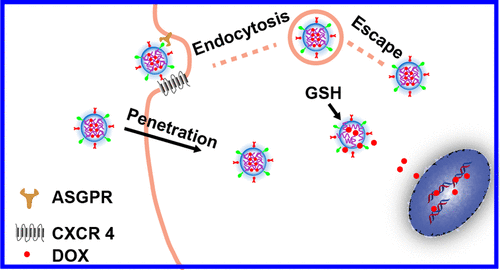当前位置:
X-MOL 学术
›
Bioconjugate Chem.
›
论文详情
Our official English website, www.x-mol.net, welcomes your feedback! (Note: you will need to create a separate account there.)
Benzylguanidine and Galactose Double-Conjugated Chitosan Nanoparticles with Reduction Responsiveness for Targeted Delivery of Doxorubicin to CXCR 4 Positive Tumors
Bioconjugate Chemistry ( IF 4.7 ) Pub Date : 2020-09-29 , DOI: 10.1021/acs.bioconjchem.0c00496 Fei Kong 1 , Cui Tang 1 , Chunhua Yin 1
Bioconjugate Chemistry ( IF 4.7 ) Pub Date : 2020-09-29 , DOI: 10.1021/acs.bioconjchem.0c00496 Fei Kong 1 , Cui Tang 1 , Chunhua Yin 1
Affiliation

|
Benzylguanidine, a small cationic and amphiphilic molecule, exhibits a high affinity to C-X-C chemokine receptor type 4 (CXCR 4) and a membrane penetration ability. It has not been used as a functional moiety of nanocarriers for the systemic delivery of chemotherapeutic drugs in tumor therapy. In this study, we investigated the membrane penetration of benzylguanidine-conjugated nanocarriers and their efficiency and safety for targeted delivery of doxorubicin (DOX) in CXCR 4 positive tumors. We conjugated the benzylguanidine bearing guanidinobenzoic acid onto the cystamine bismethacrylamide cross-linked chitosan-poly(methyl methacrylate) nanoparticles, which were then decorated with lactobionic acid (abbreviated as LGCC NPs). A small proportion of LGCC NPs were able to directly penetrate the plasma membrane to enter cells, thereby circumventing endocytic vesicles. The DOX-loaded LGCC NPs (LGCC NPs/DOX) displayed good stability under extracellular physiological conditions and reduction-triggered drug release under high glutathione (GSH) concentration. Moreover, LGCC NPs/DOX showed an increase in tumor-targeted cellular uptake through receptor-mediated endocytosis, enhanced endo/lysosomal escape, and a high nuclear distribution. More importantly, LGCC NPs/DOX significantly suppressed the in vitro and in vivo proliferation of CXCR 4 positive hepatocarcinoma and breast cancer. The findings provide a guideline for the combined application of benzylguanidine and other functional groups in antitumor nanomedicines.
中文翻译:

苄基胍和半乳糖壳聚糖纳米共轭壳聚糖纳米颗粒对阿霉素向CXCR 4阳性肿瘤的靶向递送具有还原反应。
苄基胍是一种阳离子和两亲性小分子,对4型CXC趋化因子受体(CXCR 4)具有高亲和力,并具有膜渗透能力。在肿瘤治疗中尚未将其用作化学疗法药物的全身递送的纳米载体的功能部分。在这项研究中,我们调查了苄基胍缀合的纳米载体的膜渗透性及其在CXCR 4阳性肿瘤中靶向递送阿霉素(DOX)的效率和安全性。我们将带有胍基苯甲酸的苄基胍共轭到胱胺双甲基丙烯酰胺交联的壳聚糖-聚(甲基丙烯酸甲酯)纳米粒子上,然后用乳糖酸(简称为LGCC NPs)修饰。一小部分LGCC NP能够直接穿透质膜进入细胞,从而规避了内吞小泡。装载DOX的LGCC NP(LGCC NPs / DOX)在细胞外生理条件下显示出良好的稳定性,并在高谷胱甘肽(GSH)浓度下显示还原触发的药物释放。此外,LGCC NPs / DOX通过受体介导的内吞作用显示出靶向肿瘤的细胞摄取增加,内/溶酶体逃逸增强以及核分布高度。更重要的是,LGCC NP / DOX显着抑制了CXCR 4阳性肝癌和乳腺癌的体外和体内增殖。该发现为苄基胍和其他官能团在抗肿瘤纳米药物中的联合应用提供了指导。
更新日期:2020-10-21
中文翻译:

苄基胍和半乳糖壳聚糖纳米共轭壳聚糖纳米颗粒对阿霉素向CXCR 4阳性肿瘤的靶向递送具有还原反应。
苄基胍是一种阳离子和两亲性小分子,对4型CXC趋化因子受体(CXCR 4)具有高亲和力,并具有膜渗透能力。在肿瘤治疗中尚未将其用作化学疗法药物的全身递送的纳米载体的功能部分。在这项研究中,我们调查了苄基胍缀合的纳米载体的膜渗透性及其在CXCR 4阳性肿瘤中靶向递送阿霉素(DOX)的效率和安全性。我们将带有胍基苯甲酸的苄基胍共轭到胱胺双甲基丙烯酰胺交联的壳聚糖-聚(甲基丙烯酸甲酯)纳米粒子上,然后用乳糖酸(简称为LGCC NPs)修饰。一小部分LGCC NP能够直接穿透质膜进入细胞,从而规避了内吞小泡。装载DOX的LGCC NP(LGCC NPs / DOX)在细胞外生理条件下显示出良好的稳定性,并在高谷胱甘肽(GSH)浓度下显示还原触发的药物释放。此外,LGCC NPs / DOX通过受体介导的内吞作用显示出靶向肿瘤的细胞摄取增加,内/溶酶体逃逸增强以及核分布高度。更重要的是,LGCC NP / DOX显着抑制了CXCR 4阳性肝癌和乳腺癌的体外和体内增殖。该发现为苄基胍和其他官能团在抗肿瘤纳米药物中的联合应用提供了指导。


























 京公网安备 11010802027423号
京公网安备 11010802027423号